Play Episode 2 of the second season of Dateline: Missing in America Podcast below and click here to follow.
Read the transcript here:
It’s just after dawn and people are climbing out of their trucks.
It’s so cold they can see their breath.
They got word on Facebook to meet at the Eagles Club. They’ve got miles to walk before sundown.
They set out across the south end of Bemidji. It’s a small city in northern Minnesota that sits near three Native American reservations and hugs a lake with the same name.
They’re here to follow this man, Daniel Wind.
Daniel Wind: “I’m not gonna quit. Uncle is going to find her.”
He’s looking for any sign of his 15-year-old niece, Nevaeh.
Daniel Wind: “If she’s out there, you know, we got to -- we got to find her.”
In the winter of 2021, Daniel and dozens of volunteers spent days on end searching for her, hiking through woods and brush, and along railroad tracks.
Daniel Wind: “We still got a few more hours.”
Teddi Wind is Daniel’s sister and Nevaeh’s mother.
Teddi Wind: “I couldn’t feel the cold. I couldn’t even feel if I walk four miles that day. It didn’t bother me, because I was looking for my -- my child.”
Nevaeh is still missing, but Teddi has seen her in her dreams: A girl with a cheeky smile and a blonde streak in her dark hair.
Teddi Wind: “She said she loved me, and she missed me, and that she was sorry.”
And Teddi has recorded a message for Nevaeh. It’s on her voicemail, just in case she calls.
Teddi Wind’s Voicemail: “Nevaeh, can you please leave a message? Mommy misses you and loves you.”
This is a story about a family that’s determined to bring a missing child home.
It’s a journey that has consumed them. And changed them.
Andrea Canning: “You are like a different person almost, since this happened, driven by getting answers.”
Daniel Wind: “Yeah.”
And sometimes driven by anger.
Because Daniel and Teddi, members of the Ojibwe tribe, have learned there are so many other families like them.
Daniel Wind: “It’s real, you know? The fight. The fight – the – the struggle that we got.”
I’m Andrea Canning and this is Missing in America, a podcast from Dateline.
We first featured Nevaeh Kingbird’s case in our digital series in 2022. In this episode, we’ll take you deeper into her mysterious disappearance.
Andrea Canning: “You want to solve this case?”
Det. Dan Seaberg: “Yes, I do. It’s difficult to know that a 15-year-old just disappeared.”
We’ll tell you about the intriguing clues uncovered by police and her family. And the disturbing questions those clues have raised.
So please listen closely, because you or someone you know might be able to help find Nevaeh and give her loved ones desperately needed answers.
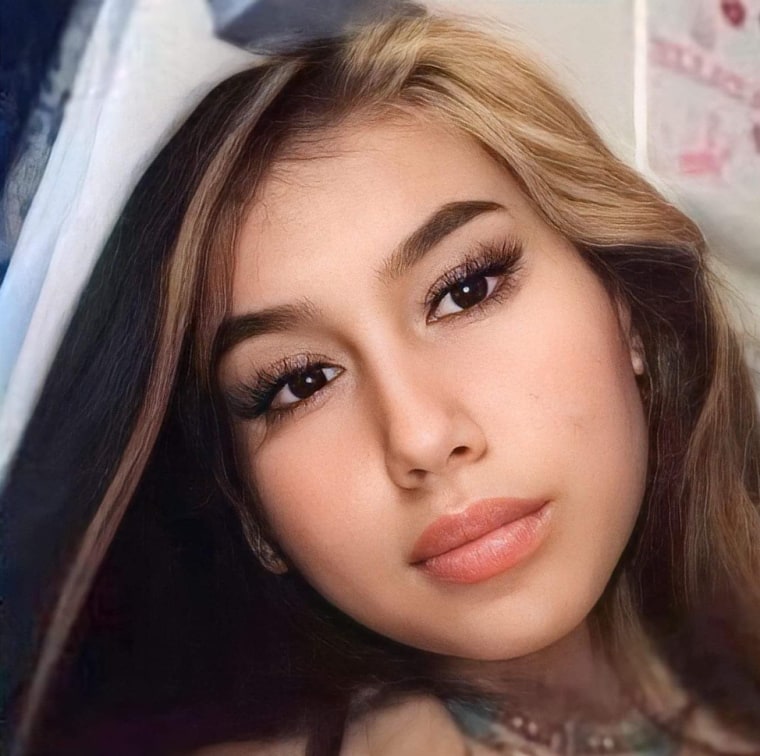
October 21, 2021. It was a Thursday afternoon and Teddi Wind was heading off to work.
She’d told her daughter Nevaeh that she could go to the movies later that evening with friends.
Teddi Wind: “I told her that she had to be back at a certain time and she said she will be. And she seemed to be really happy, in a good mood, like she was just beyond excited to just go to the movies.”
Teddi worked at a casino on one of the three reservations not far from Bemidji. She was on the four to midnight shift and called Nevaeh around 8 p.m. to chat.
But Nevaeh didn’t pick up.
Teddi Wind: “I called a couple times and I didn’t get answers. I’m like, ‘Oh, she’s probably not back from the movies yet.’ So I kept on trying. Kept on trying. And then she finally answered and she was kind of slurring her words. And I said, ‘What’s wrong with you?’ And she said, ‘Nothing’s wrong with me, Mom.’ And then she started crying.”
Teddi’s mama bear alarm was blaring.
Nevaeh had recently lost two friends to suicide and she’d been struggling with her grief. In fact, Teddi had been so concerned, she’d taken five days off work to be with Nevaeh and make sure she was OK.
Now, she told her supervisor that she had to leave early and rushed home. What she saw when she got there was hard to absorb.
Sprawled in her living room were a half dozen or so teenagers she didn’t know. At least one of them appeared to be passed out. But where was Nevaeh? Teddi headed upstairs and that’s where she found her daughter.
Teddi Wind: “And I looked at her and she was just, like, looking through me. And that’s when I could tell it was alcohol that she was on.”
Nevaeh had pulled a bait-and-switch straight out of the teenage handbook. Turns out she hadn’t gone to the movies, she’d been partying with friends at another house on a reservation 20 miles away.
Teddi Wind: “And then they got kicked out of that party and came to my house. And I end up confronting Nevaeh about, ‘Why are these kids here? Why are you drunk? And why do you have a bottle in your hand?’ I think I was just talking too fast for her, and she’s like, ‘Mom, Mom, Mom.’”
And that’s when Teddi says one of the teenagers started pushing her.
Teddi Wind: “She wouldn’t let me near Nevaeh. She was standing between me and Nevaeh. And I said, ‘I’m going to call the cops.’ And then she goes, ‘No, Mom, don’t call the cops.’ And I was like, ‘Your friend’s trying to fight me. I have to call the cops, I don’t know who these kids are.’”
Teddi went outside, got in her truck and sat in the dark, staring at her phone, thinking about how much she and Nevaeh had been through together -- how close they once were.
Teddi had always thought of Nevaeh as her “Momma’s girl.”
Teddi Wind: “Nevaeh was only 2 years old -- just a few months over 2 years old -- when me and her dad split up.”
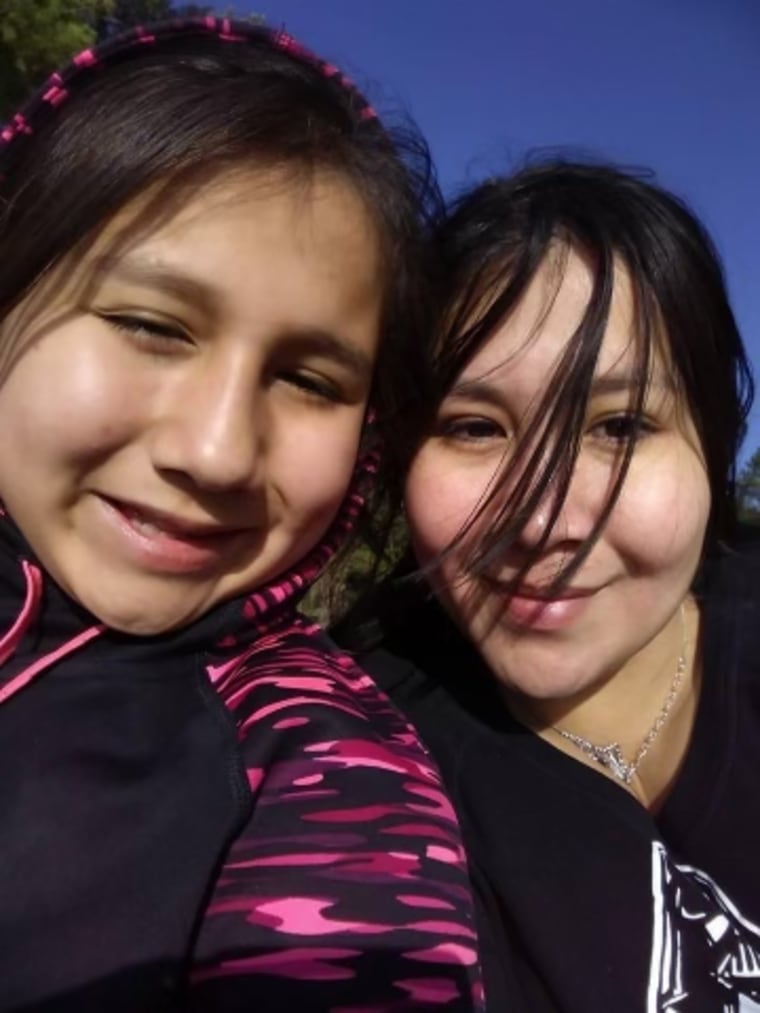
The third oldest of Teddi’s six children, it was Nevaeh who helped her single mom keep the rest of the kids in line.
Even when she was little, Nevaeh would pick out her younger brothers’ and sister’s clothes. Make sure their hair was brushed.
Teddi Wind: “Nevaeh was the boss of everybody. Even me. She stayed that way all her whole life.”
Andrea Canning: “She would take charge.”
Teddi Wind: “Yeah. She was in charge of everything. She made sure of that. And I allowed her to be that way. I just knew that it was her way or no way.”
Teddi says Nevaeh loved her with that same fierce spirit.
Teddi Wind: “If I’m eating, she would eat off my plate. If I give her the same thing, she would switch my plate and take it, give me her plate. I felt like she was still holding on -- being a baby to me.”
Andrea Canning: “I know how teenagers and their moms -- I know It can be hard. Did you two have that same experience of that transition into being a teenager?”
Teddi Wind: “Oh, yeah. Definitely. Like, Nevaeh developed faster. She was taller than my other daughter and her body developed faster than hers.
Teddi says by age 12 Nevaeh had confided in her that she was what some Native Americans call “Two Spirit,” meaning a person who embodies both a male and female spirit. Nevaeh’s revelation was no surprise to Teddi, though.
Teddi Wind: “Nevaeh likes girls. I figured that out at a young age for her. Because, um, when kids were liking Justin Bieber, she was liking Selena Gomez. So I’m like, ‘All right.’ I knew she –. They’re like, ‘Oh, Nevaeh, you can’t like girls.’ And Nevaeh’s like, ‘I like whoever I want to like.’”
Andrea Canning: “You two didn’t butt heads over her being Two Spirit?”
Teddi Wind: “No, not at all. The only thing I was upset with was the choice of the people she was interested in. They were not very kind to her. And I – I learned that I had to let my kids make their own choices.”
Now, sitting in her truck, Teddi faced a choice of her own. Nevaeh had begged her not to call the police, but she was terribly worried.
Teddi Wind: “And I was like, ‘I got to call them.’”
Teddi dialed 911. And then she heard banging from her garage.
Teddi Wind: “The girl who was trying to fight me walked out the wrong door. Instead of going straight, she went into my garage door. So I let her out my garage door and I was like, ‘Where’s Nevaeh?’ And she’s like, ‘Nevaeh left.’ And I went to the back door and the back door was wide open.”
Before Teddi even had time to think, the Bemidji town police arrived at the scene.
And then everything was chaos. Another police car showed up, then an ambulance. One of the teenagers was taken to the hospital with alcohol poisoning.
Only then did Teddi get a chance to tell officers that her 15-year-old daughter had slipped out, drunk, into the bone-chilling dark.

It was after one o’clock in the morning in Bemidji, Minnesota.
Teddi Wind was watching city police cart drunk teenagers out of her house, but there was no sign of her own 15-year-old daughter, Nevaeh.
She’d slipped out the back door into the frigid night. It was only 23 degrees.
Teddi Wind: “It wasn’t snowing out, but it was super cold, you know, like – like desert cold at night.”
So Teddi reported Nevaeh missing to one of the officers.
Teddi Wind: “And he goes, ‘Oh, she just ran away on you.’ And I was like, ‘Well, then you need to go find her, because she is intoxicated.’”
Police officers went looking for Nevaeh but they didn’t see her on the roads, in the dark.
Her mother was worried, but wasn’t panicking. Not yet.
Teddi Wind: “I thought she was just going to, um, wake up at one of her friend’s house, and then contact me and we’d fix it.”
Teddi couldn’t just call Nevaeh. Nevaeh’s phone didn’t work unless it was connected to Wi-Fi; they usually chatted on social media.
But there was no message from Nevaeh the next day, or the next.
Teddi reached out to her brother, Daniel.
Daniel Wind: “She says, ‘Brother, brother, Nevaeh’s gone. I can’t reach her. She hasn’t been active.’ And I said, ‘Well, just – just give her a day, you know? Just give her a day and she’ll come home.’”
Then, before Teddi could do much more, a curve ball knocked her off her feet.
She and her children came down with COVID and she could barely function, even as her missing child spoke to her in her sleep.
Teddi Wind: “I kept on having bad dreams of her. I had a dream of her being in, like, some fancy house with another girl and she was telling me she was dead and she can’t come home.”
In Teddi’s house, Nevaeh’s absence filled every corner.
And there was someone else who wasn’t there: her sister, Lakaylee.
Lakaylee Kingbird: “It just, like, irks my soul, I guess. Because I couldn’t be there.”
She’s one year older than Nevaeh and was away at a residential program that provides support for teens with mental health issues.
Andrea Canning: “That must have been such a struggle for you, not being home during this time.”
Lakaylee Kingbird: “Yeah, it made me feel, like, helpless.”
Because Lakaylee knew Nevaeh better than anyone.
Lakaylee Kingbird: “We would talk to each other, like, tell each other everything. Like, every night after school she would tell me about school, her day.”
Nevaeh loved school and had big plans for both of them. Lakaylee read me a text that Nevaeh sent her a year before she disappeared.
Lakaylee Kingbird: “She said, ‘When we get older I want to get an apartment together in New York while I go to college to get my bachelor's degree.’ That’s what she said to me.”
Andrea Canning: “Those are big dreams.”
Lakaylee Kingbird: “Yeah.”
Andrea Canning: “Going to New York and – and bringing her sister with her.”
Lakaylee Kingbird: “Yeah, we were—we were close, very close.”
At first, Lakaylee wasn’t surprised when she found out Nevaeh had taken off into the night after Teddi busted up the party.
Lakaylee Kingbird: “I would be on the run, too, because I’d be scared to go home after I just brought a bunch of random people into my mom’s house.”
You might think Lakaylee is being dramatic when she says she would have run away, too. But here’s the thing you need to know about Nevaeh — something her family and police were aware of as they tried to track her down those first few weeks.
Andrea Canning: “You and Nevaeh had run away before.”
Lakaylee Kingbird: “Yeah.”
Not once, but repeatedly. Nevaeh and Lakaylee had both run away from home separately -- and one time, they did it together. Nevaeh stayed away for an entire month.
As fiercely as Nevaeh loved her mother, they could argue, too.
Lakaylee Kingbird: “All of us kids bumped heads with my mom. But, like, who doesn’t bump heads with their mom? Um, but we took it, like, deep, I guess.”
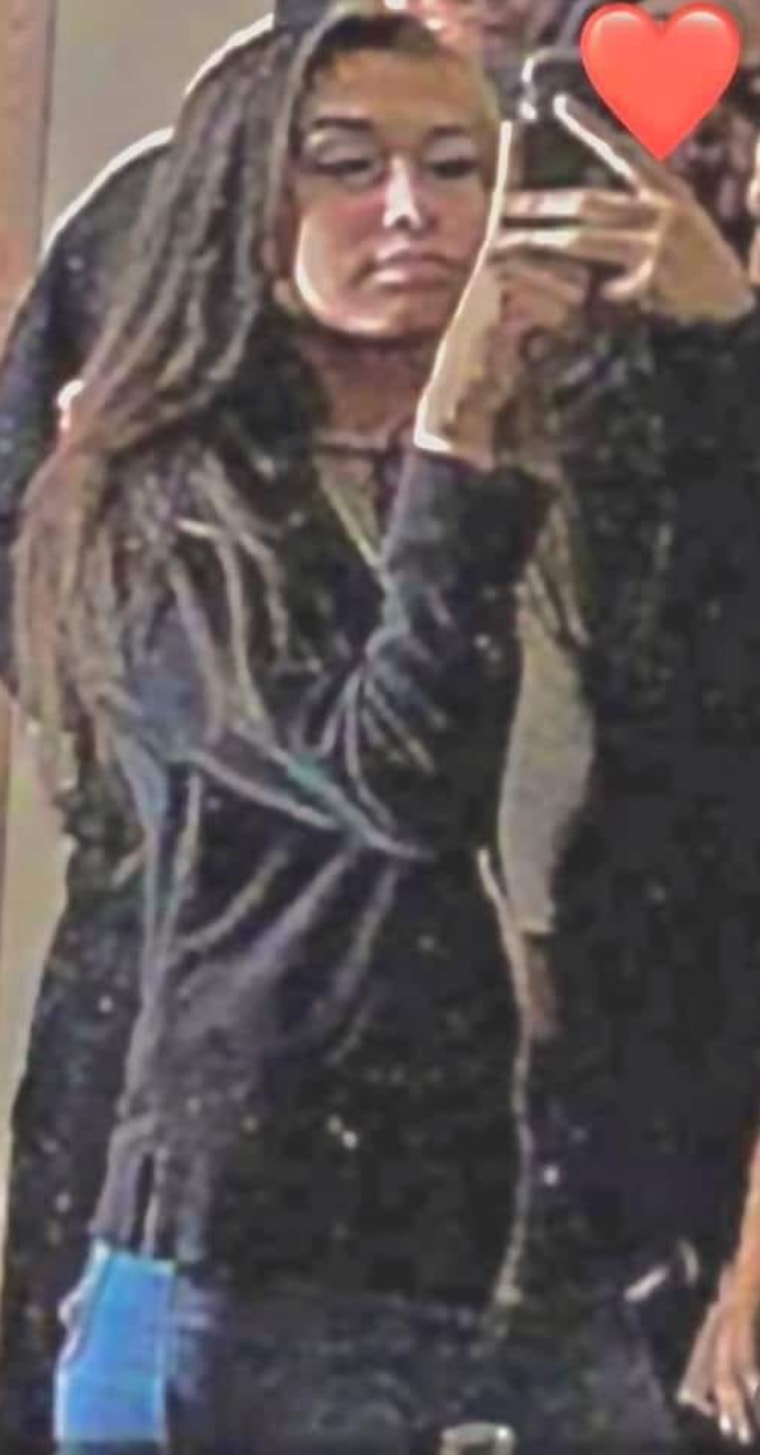
When she first told the Bemidji police that Nevaeh was missing, Teddi reported her as a runaway.
Looking back, she wonders if that label stopped the police from working Nevaeh’s case hard in those early days.
She says it took a week for the officer she filed her report with to even call her.
Teddi Wind: “He said, ‘Did Nevaeh come home?’ And I said, ‘No, Nevaeh didn’t come home, not yet.’ And then he goes, ‘All right, I’ll call you in a week to see if she came home.’ And then he hung up.”
She blames herself for not pushing them to do more.
Teddi Wind: “I kick myself in the butt more, like, I think I’m more hard on myself than I am hard on anybody else, because I’m like, ‘What could I have done more to search for my -- or my daughter?’”
After several weeks with no word from Nevaeh, Lakaylee realized this time was different. She believed Nevaeh hadn’t just run away.
Lakaylee Kingbird: “She would always, like, keep in contact. Like, even though she was on the run, she would keep in contact, even if it was through somebody else’s social media. But there’s no signs. Nothing.”
Another red flag to Lakaylee...
Lakaylee Kingbird: “She hasn’t came back for none of her clothes. Her clothes are like everything to her. And it’s just, like, surprising that she didn’t leave with anything.”
And then there was their little sister, Natalie, who was 5. She was so close to Nevaeh she’d fall asleep in her bed every night. Lakaylee and Teddi didn’t think Nevaeh would ever leave her willingly.
Teddi Wind: “Natalie was her whole world.”
Andrea Canning: “Those two were close, huh?”
Teddi Wind: “Yes, very close.”
If Nevaeh wasn’t a runaway, then what had happened to her?
In November 2021, the case hit a grim milestone.
Det. Dan Seaberg: “Around the 30-day mark is when an investigation starts.”
The teenager’s case file was handed off to a detective, which is department protocol for runaways who are still missing after a month.
Detective Sergeant Dan Seaberg, a veteran of the Bemidji Police Department, said the officers before him had done their best to find Nevaeh, but this wasn’t a typical runaway case. Nevaeh had been gone too long.
Andrea Canning: “Do they usually come back, in your experience?”
Det. Dan Seaberg: “Usually, they are -- they return home.”
Andrea Canning: “So this -- this was a big cause for alarm that Nevaeh had not returned home.”
Det. Dan Seaberg: “Correct. When Teddi informed me she hadn’t been active on any social media and friends were reporting they hadn’t heard from her, it made me very concerned.”
Nevaeh’s mother was now in full panic mode. It wasn’t just her daughter’s silence that worried her.
She had found out something new, a potentially huge break in the case which she shared with Detective Seaberg: Where Nevaeh went after bolting from their house.
Someone told Teddi’s 12-year-old son that Nevaeh and another girl had run to a trailer park, just a few blocks away.
Nevaeh knew someone there. The girls had climbed through a window to get inside his trailer.
Det. Dan Seaberg: “So I spoke to a number of people that were in that trailer. Nevaeh and her friend showed up. Nevaeh and her friend were there for a while visiting. They were talking. The juvenile male’s dad knock -- or stepdad -- knocks on the door, because he hears voices. So he’s telling everyone they need to go home. When he knocks on the door, Nevaeh jumped out of the window. The juveniles looked out of the window and Nevaeh was gone.”
Her friend had got a ride home but Nevaeh had run off into the dark again, this time alone.
And she’d left her phone behind, which maybe explained why no one had heard from Nevaeh.
Det. Dan Seaberg: “Nevaeh and her friend both left their phones behind. The juvenile male that resides at the residence actually found their phones a couple weeks later between his bed and the wall. So they must have fallen out when they climbed in the window.”
Andrea Canning: “Was anyone able to get into her phone? Did it provide any information?”
Det. Dan Seaberg: “Yes, we were able to finally crack the passcode on her phone and we got into it. It hasn’t provided any further information.”
Andrea Canning: “So no messages from anyone saying, ‘I’ll come pick you up,’ or Nevaeh telling someone, you know, ‘I’ll come over to your place.’ Nothing like that?”
Detective Dan Seaberg: “Nothing that night, no.”
And no trace of security camera her on the trailer park’s footage, either.
Det. Dan Seaberg: “We checked with everyone that had security cameras in the trailer park that night. And no one’s security cameras went back to the night in question.”
Andrea Canning: “That’s a shame that that couldn’t have been done sooner.”
Det. Dan Seaberg: “It is, yes.”
Andrea Canning: “Precious time was lost.”
Det. Dan Seaberg: “Yup.”
Investigators used dogs and drones to search the area around the trailer park. The detective had a sobering working theory about what might have happened.
Andrea Canning: “You thought she might have frozen to death or been incapacitated somewhere?”
Det. Dan Seaberg: “Yeah, jumping out of the window. And she fell asleep somewhere because she was trying to hide, or um, just laid down.”
The police search came up with nothing and the trail went cold until a crime analyst at the Bemidji Police Department spotted another possible clue in a property damage report, of all places.
It had been filed about eight hours after Nevaeh jumped out of the window at that trailer park.
Det. Dan Seaberg: “The complainant reported that a female had knocked on their door, early morning hours, and asked for somebody and then had left. And the following morning when they woke up, they found their detached garage had two broken windows on it.”
Could it have been Nevaeh seeking shelter in the cold? The people who filed the complaint lived just south of the trailer park. Detective Seaberg went to see them.
Det. Dan Seaberg: “They described a mid-teen Native American female with dark, wavy hair with either blonde or orange highlights in it.”
They also described what she was wearing.
Det. Dan Seaberg: “A black zip-up hooded sweatshirt, with a white t-shirt, skinny jeans and no shoes, dark colored socks.”
Andrea Canning: “No shoes?”
Det. Dan Seaberg: “Yeah, no shoes.”
That description matches the clothes Nevaeh was wearing that night. But when Detective Seaberg showed the couple the photos of Nevaeh, they didn’t identify her as the female who knocked on the door.
Det. Dan Seaberg: “They indicated that they didn’t believe it was Nevaeh, due to some different things in the photos. But in talking to them, the description they provide matches almost to a tee.”
Andrea Canning: “Do you think she spent the night in that garage?”
Det. Dan Seaberg: “I don’t know that.”
If she had, she was clearly gone by the morning when the property owner had called the sheriff’s office.
Andrea Canning: “Did they live near a busy road at all? A highway? Somewhere where she could have hitchhiked?”
Det. Dan Seaberg: “Yeah. Yeah, they lived right along Washington Avenue, which is a main -- main road leaving Bemidji, southbound.”
Some people think that road might just lead to answers in this mystery, and possibly another one.
Andrea Canning: “Do you think there’s any possibility that Nevaeh and Jeremy’s disappearances are connected?”

Winter was coming in Bemidji, Minnesota.
Temperatures were dropping. Snowstorms gathering.
And so were theories about what had happened to 15-year-old Nevaeh Kingbird. She’d been missing for more than a month.
A girl who looked like her had been reported to police hours after Nevaeh disappeared, close to a road leading out of town.
Andrea Canning: “Have you heard about the theories of human trafficking – that she might have, you know, met with harm when she possibly went out to that road?”
Det. Dan Seaberg: “We don’t have any evidence of that, but it’s definitely a possibility.”
Andrea Canning: “Is human trafficking an issue in Bemidji?”
Det. Dan Seaberg: “We don’t see a large amount of human trafficking in Bemidji, but it’s definitely prevalent in the northern part of the state.”
A few weeks after Nevaeh disappeared, there was another possible sighting. A girl with a black eye and a resemblance to Nevaeh was spotted by a family friend at a Target store. Could it be her?
Detective Seaberg tracked down the girl and talked to her. She wasn’t Nevaeh.
Andrea Canning: “So, a dead end. False alarm.”
Det. Dan Seaberg: “Correct.”
For Nevaeh’s mother, the false alarms and the uncertainty were agony. She couldn’t stop thinking about the night of the party.
Teddi Wind: “I felt like I was frozen in time. Because, I’m like, ‘Should I have not called the cops on them kids?’ Or you know, like, just -- just beating myself up like that.”
Then, almost two months after her disappearance, came another painful moment for the family.
A big storm had covered Bemidji in knee-deep snow. Law enforcement suspended their searches for Nevaeh.
Det. Dan Seaberg: “We had done what we believed we could do, due to the snow.”
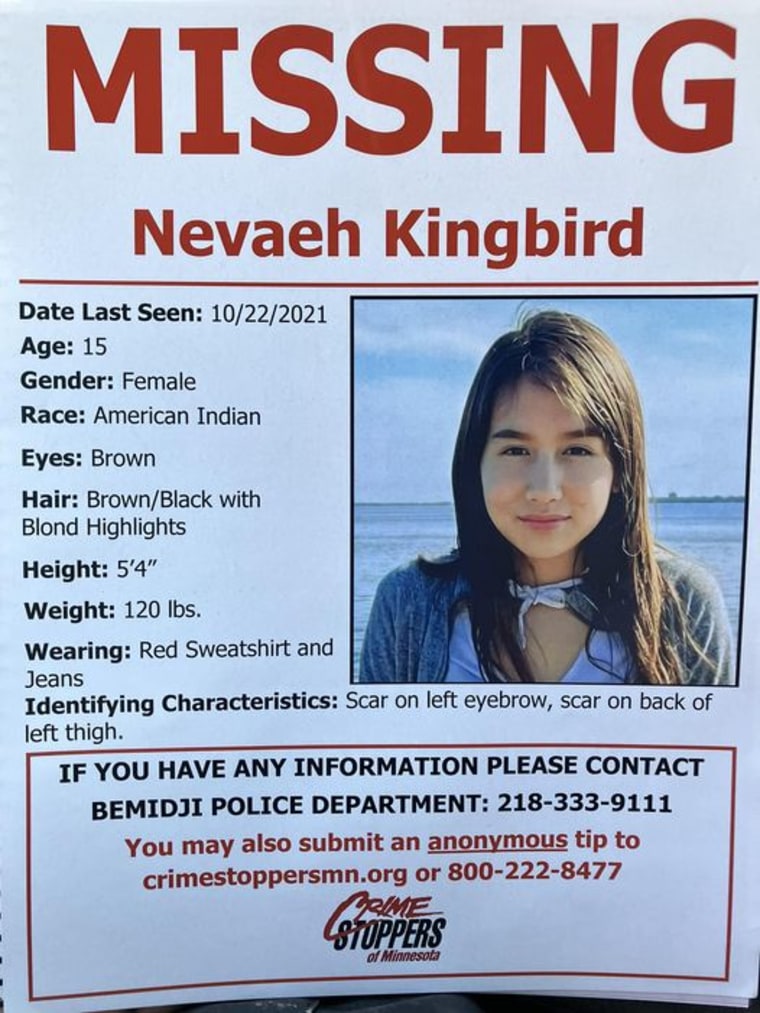
Teddi was determined to keep the search going. She asked volunteers to meet the family at the Dollar General store near her house.
Hundreds of people showed up, including her brother, Daniel.
When Nevaeh disappeared, he’d told Teddi not to worry, told her Nevaeh would come home.
Daniel Wind: “And it wasn’t until the day, the actual day of the search, it -- it hit me like a f------ wave, you know? And, you know, and then I --. Yeah.”
Andrea Canning: “The search made it feel real. That -- here we are looking for Nevaeh. That she’s --.”
Daniel Wind: “Yup, reality hit. Yup.”
Something else hit Daniel during the family’s first search.
Daniel Wind: “I noticed there’s a – it was lacking structure and, like, organization. Nobody was doing grids. Nobody was keeping track of what was searched. And I was like, ‘Dang.’ I knew I had to step up.”
Daniel knew more than most about that kind of thing. He had spent more than a decade working as a firefighter, battling wildfires across Minnesota.
Andrea Canning: “I’m sure you never thought your experience fighting wildfires would translate into your own search for your niece.”
Daniel Wind: “Yeah.”
At the family’s second search four days later, Daniel took the lead.
Daniel Wind at search: “The volunteers, they’re marching out for our second large area search.”
And this time they found something at the trailer park.
Buried in the snow was a pair of frozen women’s jeans.
Then, a few days after that, someone found another piece of clothing. A sweatshirt that looked like one Nevaeh’s grandmother owned. It had strands of hair in the hood.
Police collected both of the items. Daniel and Teddi kept searching in the bitter cold.
Teddi Wind: “I couldn’t even talk. I cried all the time. I was hysterical. I was out there digging in snow piles to see if my daughter was under them snow piles.”
Andrea Canning: “Just trying to imagine you as a mother searching for your own daughter, that fear of what’s around the corner. You know, what’s under that snow pile?”
Teddi Wind: “I was afraid. More afraid than I ever been in my whole life.”
After weeks of searching, even a trained first responder like Daniel was struggling.
Daniel Wind: “I’m able to keep my emotions intact, but, like, when it -- when they hit, it cuts deep. The hurt -- the sadness -- is just as intense as the anger when that comes, you know what I mean?”
Andrea Canning: “Yeah.”
And Daniel was plenty angry with the police.
Daniel Wind: “The first thing I noticed at that first search is there was absolutely no law enforcement present there, whatsoever. Like, you look at all these searches on the news. They’re out there leading searches or they’re out there taking part in them. I didn’t even see one cop, one patrolman there.”
It made him think the police just didn’t care about a missing Indigenous girl.
Daniel Wind: “The world reacts different to us, you know what I mean? You know, I’m not saying that directly to anybody, it’s just – it’s the way life is for us, you know?”
Five months after Nevaeh disappeared, her family was starting to feel defeated. And so alone.
And that’s when someone new came into their lives.
Teddi Wind: “She brought me hope. She brought -- she brought -- she brought that to me. Sorry.”
Andrea Canning: “No, it’s OK.”
Teddi is talking about a woman named Lissa Yellow Bird.
Lissa Yellow Bird: “I am a justice seeker for missing, murdered and exploited people, with a preference for Indigenous people.”
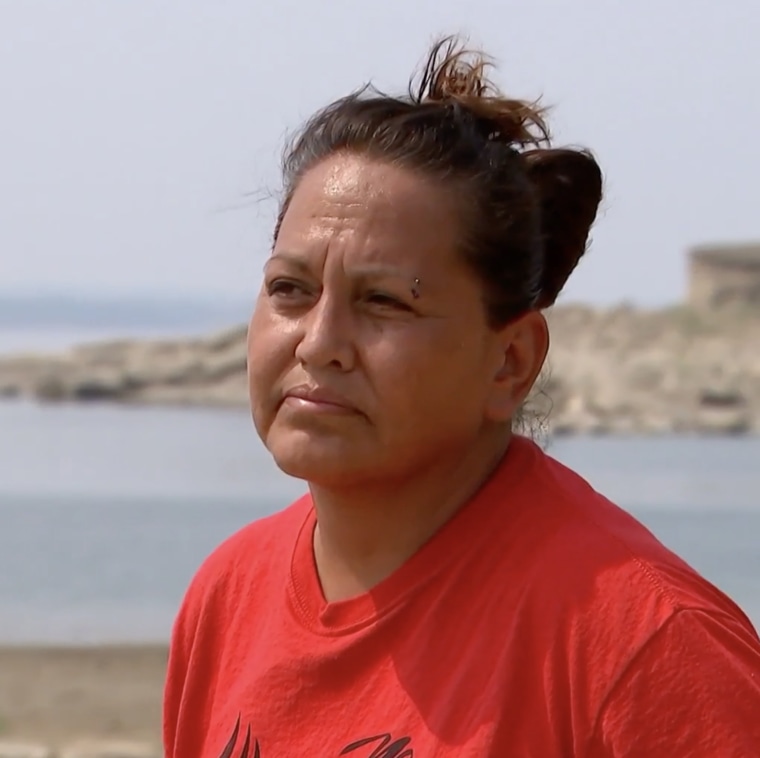
I first met Lissa in 2020 when I was reporting on a story for Dateline about her murdered niece, Carla. Lissa helped police track down the killer.
She’s helped locate dozens of missing people.
Some of them alive. Some not.
Andrea Canning: “You’ve seen so many cases like this.”
Lissa Yellow Bird: “Right. It’s like, one wrong move, one miscalculation, and there’s a person missing. What happened that evening with Nevaeh happens all the time.”
Lissa lives in North Dakota, almost 400 miles from Bemidji, but she knew the area where Nevaeh was last seen very well.
Lissa Yellow Bird: “It was Theresa Jordain that reached out to me first and said, ‘Are you aware that there’s a young lady missing in the area? Nevaeh Kingbird.’ And I said I was not.”
Five years before Nevaeh disappeared, Lissa had come to Bemidji to help Teresa search for her 17-year-old son, Jeremy. Like Nevaeh, he’d vanished after leaving a party.
Police found Jeremy’s backpack lying in the middle of the road, but no trace of Jeremy himself.
Detective Seaberg told us there’s no evidence the disappearances are related, but Lissa says the similarities are uncanny, not least that Jeremy vanished less than a mile from the trailer park.
Lissa Yellow Bird: “It’s haunting. It’s pretty haunting.”
Lissa swung into action. Over the phone she and Teddi and Daniel strategized and made a plan. Then she drove more than six hours with her cadaver dogs to help Daniel and the rest of the family search.
Daniel Wind at search: “Day five. This is Badow from Sahnish Scouts – Lissa Yellow Bird Chase’s doggie.”
In a video Daniel recorded, Badow trots ahead of him, nose close to the snow.
Daniel Wind at search: “Me and him have been partnered up for five days now. Covered a lot of ground last four to five days.”
Daniel tried to hold out hope that his niece was still alive, but following behind the dogs he knew if they found Nevaeh they would most likely find her body.
Daniel Wind: “Me and my girlfriend, we found a tarp laying in the middle of the snow -- it was on top of the snow. And it looked about the right size. I walked up and grabbed it and went to pull it, and my heart – my heart almost, like, -- . I thought I was ready, you know?”
Andrea Canning: “Did you think it was Nevaeh?”
Daniel Wind: “I was just ready -- ready for it to be something, you know? And it ended up being a dog frozen there. But it scared the s--- out of me like that.”
Andrea Canning: “That’s still unsettling. Even finding a frozen dog is awful.”
Andrea Canning: “Did Lissa’s searches turn up anything? Did they help at all?”
Teddi Wind: “We found Nevaeh’s eyeliner and her lighter.”
Or at least, an eyeliner that was the same brand that Nevaeh always carried with her.
With each search, Daniel felt like they were making progress. He said it was helpful even when the dogs found nothing, because he trusted their keen sense of smell.
Daniel Wind: “I was able to have that peace of mind that there’s nothing there, that we can move to the next spot.”
But it was something else Lissa did that Daniel says has changed his life. Before Lissa came to town, Daniel had been too shy to share Nevaeh’s story with strangers. Lissa didn’t have any patience for that.
Lissa Yellow Bird: “And I tell him, ‘Look, Nevaeh’s not here to speak for herself. You are her voice. We don’t got time for being shy. You have an audience here and you got one chance to make them care about Nevaeh as much as you do.’”
Lissa nudged Daniel and Teddi to ask neighbors and strangers, too, for tips and information.
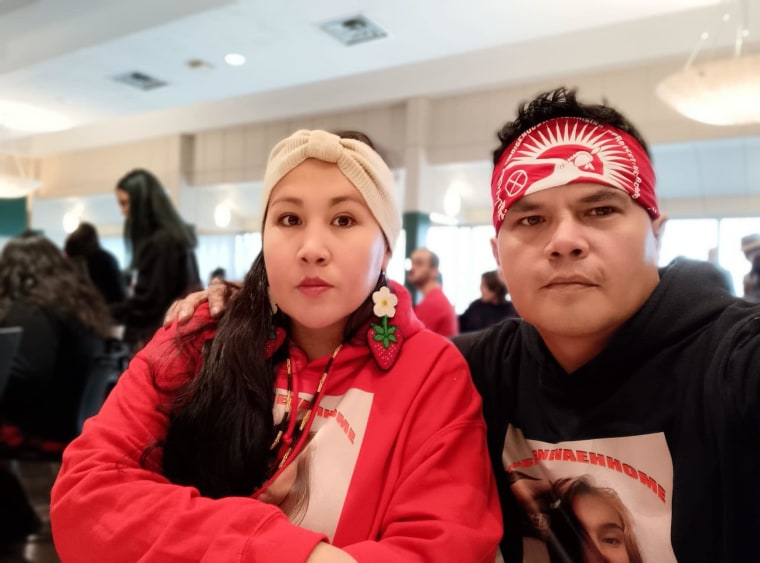
Lissa Yellow Bird: “There’s something that keeps a lot of families from going and knocking on the door. And so I and Daniel and Teddi basically started knocking on doors.”
Daniel Wind: “You get this feeling that people don’t care, you know, the other people around Bemidji, and -- but you go door to door and you talk to them and some of them start crying and they get you crying. It’s crazy how much people actually do care and want to help.”
As time went on, Daniel says he noticed other families in his community suffering, missing a loved one like he was. He felt like his eyes had been opened to the epidemic right in front of him and across the country.
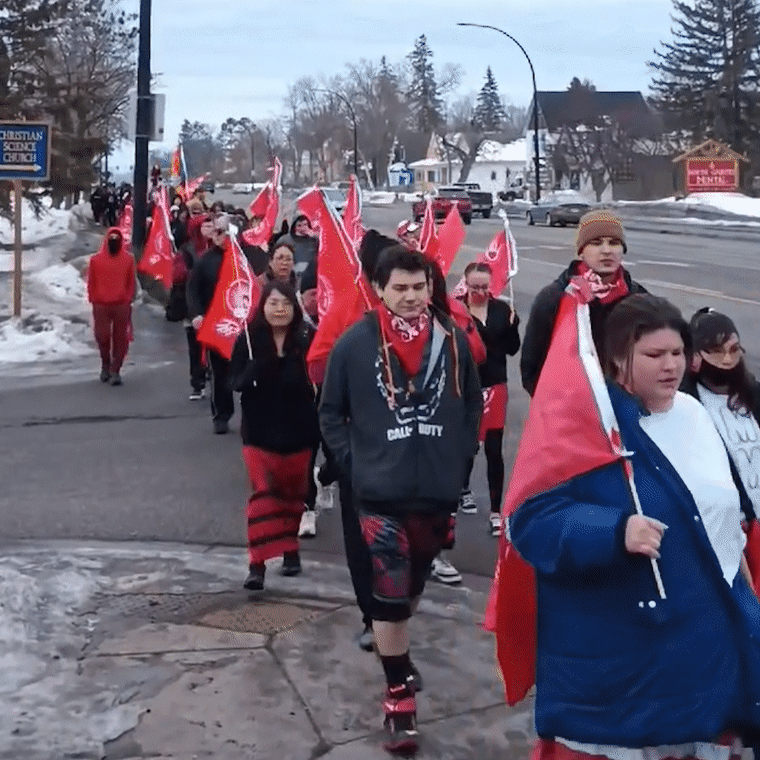
According to the FBI’s National Crime Information Center, Nevaeh was just one of more than 6,000 Indigenous children and teenagers who were missing in 2021.
He began going to marches and rallies to raise awareness, not just about Nevaeh but other young women like her.
Daniel Wind: “That was a good walk. That was a good little walk.”
He also started giving speeches.
Andrea Canning: “You have gone, Daniel, from someone who, from what I understand, hated public speaking. And now you’ve turned into an activist. You are like a different person, almost, since this happened.”
Daniel Wind: “Yeah. Like I said, I’m doing it for Nevaeh and her siblings and my -- my sister. But, yeah. Because you -- because nobody else is, you know?”
We asked Detective Seaberg if Daniel was right to think that the family was on its own.
Andrea Canning: “There’s, you know, the thought that Nevaeh didn’t get the attention that, say, a white girl would have gotten.”
Det. Dan Seaberg: “I mean, some people may believe that, but that is not the case in this.”
The detective told us he has worked the case tirelessly, chasing down dozens of tips and keeping the family informed.
Andrea Canning: “The family says, you know, they -- they went out and searched that winter in the, you know, the brutal temperatures. They don’t understand why the authorities didn’t go out.”
Det. Dan Seaberg: “And that’s a conversation I had with family. I informed them that we couldn’t expend -- expend the resources walking through knee-deep snow, when we would just have to redo it again in the spring.”
And he said police did do a few small searches that winter, looking for any animal activity that might signal the presence of human remains. They didn’t see anything.
We also asked Detective Seaberg about the frozen jeans the family found and what police had done with them.
Det. Dan Seaberg: “They don’t appear to be the jeans she was wearing, no.”
Andrea Canning: “Were they tested at all, or is this just eyeballing?”
Det. Dan Seaberg: “Eyeballing, and the fact that the -- the conditions of the jeans, they appeared to have been in the woods longer than just over a month.”
Andrea Canning: “So you don’t think those were Nevaeh’s jeans?”
Det. Dan Seaberg: “I don’t believe so, no.”
As for the sweatshirt that looked like Nevaeh’s grandmother’s, the detective sent it to the lab for testing. He said the hair did not belong to Nevaeh. He’s waiting for results to come back about the eyeliner.
In May 2022, seven months after Nevaeh went missing, the snow had melted, and Detective Seaberg launched a series of new searches. And this time law enforcement showed up with planes, ATVs and underwater search equipment.
They were armed with GPS tracking devices, dog teams and drones. They scoured 1,100 acres.
And on a warm spring day, Nevaeh’s family joined them. Instead of his snow gear, Daniel was there in a t-shirt, sweating in the sun.
Daniel Wind at search: “Another day searching, you know. Pray for us to get some answers today.”
They didn’t. But this time the family felt like investigators were working with them, working to find their Nevaeh.
Andrea Canning: “You want to solve this case?”
Det. Dan Seaberg: “Yes, I do.”
Andrea Canning: “It seems obvious.”
Det. Dan Seaberg: “Yes. I want – I want closure for Teddi and her family. These types of cases are not fun for whichever investigator is the primary on it. It’s something that sits there and it’s something that you see and work with every day. And it’s difficult to know that a 15-year-old just disappeared."
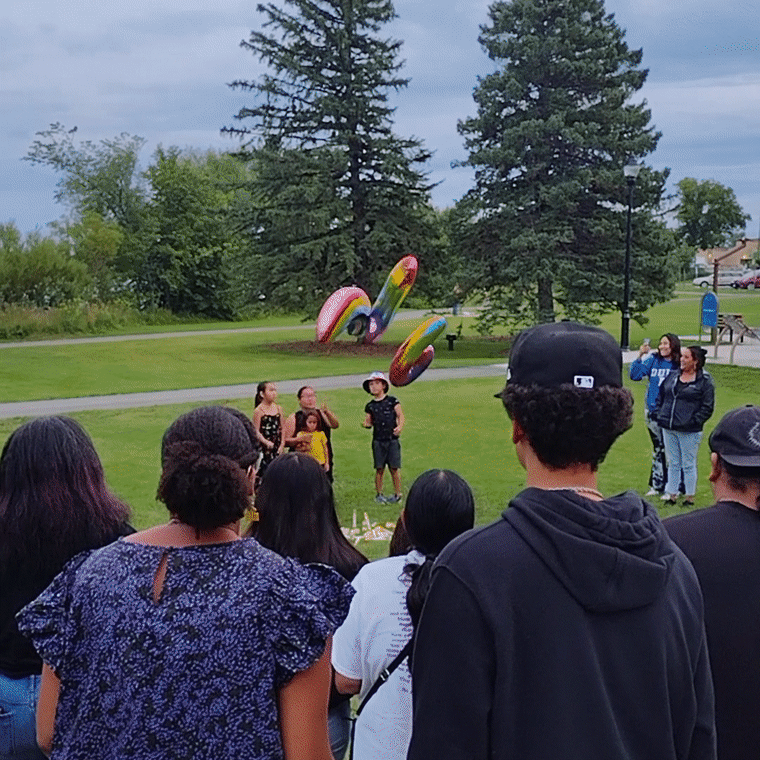
Ten months after she vanished, Nevaeh’s family and friends celebrated her 16th birthday without her.
They gathered in a park. Children released balloons that rose into the summer sky.
Lakaylee says she thinks about her sister every day.
She’s working hard to do what Nevaeh always wanted to do: graduate high school.
Andrea Canning: “Because you two were going to do it together.”
Lakaylee Kingbird: “Yeah, we were.”
Andrea Canning: “Do you have a message for Nevaeh -- if there was any chance that she heard this?”
Lakaylee Kingbird: “Just that, you know, her family is still here and we’re not going to give up until we find out what happened. And we’re not mad, but we’re hurting. Definitely hurting.”
Nevaeh’s mother says that hurt never leaves her but she also has some hope these days. She feels supported by advocates like Lissa Yellow Bird and heard by Detective Seaberg.
She has faith that she might get answers one day.
Andrea Canning: “Nevaeh is heaven spelled backwards.”
Teddi Wind: “Yes, Nevaeh is heaven spelled backwards.”
Andrea Canning: “Do you think Nevaeh is in heaven now?”
Teddi Wind: “I don’t know, honestly. For a while there, I did. But like I said, I got hope again. Where I’m hoping that she will come home someday.”
Daniel Wind says he will do whatever it takes to bring her home.
Andrea Canning: “How badly do you want someone to come forward and say, ‘Yes, I know something.’ What’s your plea to them?”
Daniel Wind: “Yeah, I pray every day. Like -- like -- like I tell people, I don’t lock people up. I just want to find my --. I just want to find my niece, you know what I mean? I just want to bring her home. She got siblings that miss her, you know? And her mom misses her, you know? We miss her. We just want answers. I’m not going to quit. Uncle is going to find her.”
Here’s where you can help...
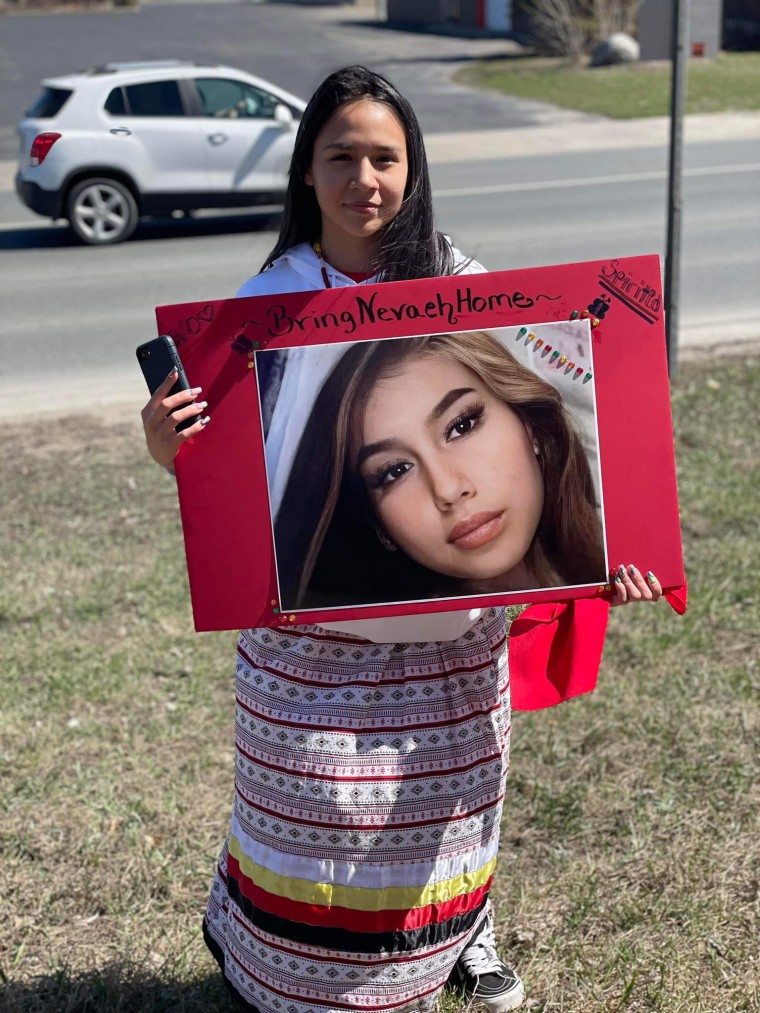
Nevaeh Kingbird is 5’4” and at the time of her disappearance, she weighed 120 lbs.
She has brown eyes and dark brown hair with blonde streaks. She has a scar on her left eyebrow and another on her left thigh, and was last seen in the Nymore neighborhood of Bemidji, Minnesota.
If you know anything or saw something, please call the Bemidji Police tip line at 218-333-9111 or the National Center for Missing and Exploited Children at 1-800-THE LOST.
To see a photo of Nevaeh and learn more about other people we’ve covered in our “Missing In America” series go to DatelineMissingInAmerica.com.
There, you’ll be able to submit cases you think we should cover in the future.
